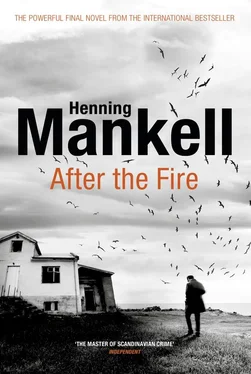That night I slept on the skerry for the first time without needing to use my tent. I dreamed that I was on board a boat; the skerry had broken away from the bedrock and was carrying me to the distant Öresund Sound.
I woke up early the next morning. It was the first of May, and the air was warm. I had told Kolbjörn and Anton to wait until after the holiday before they made a start on the house, but Kolbjörn had said there was no point in hanging around.
After breakfast I went over to the island. They arrived at nine, the ferry laden with a small digger, a shed and an unconscionable number of tools. I sat on the bench by the boathouse and watched as things got under way. Anton was a real grafter. I could see that he took the same intense pleasure in his work as his father. It wouldn’t take long before his digger had cleared the ruins and made room for my new house.
They packed up for the day at about six. A blackbird landed on the roof of their shed, the first one I had heard this year.
I walked down to the jetty with them.
‘I want to bury a token, a memorial under the new house,’ I said to Kolbjörn as Anton started up the engine.
‘How big is it?’
‘It’s just a small tin containing a shoe buckle.’
He looked intrigued.
‘It’s a very fine buckle,’ I went on. ‘It holds a special meaning for me.’
‘I’ll ask Anton to dig a hole right in the middle of the foundations. If there’s a rock in the way we can take it out with a non-explosive demolition agent.’
I waved to them as they left; I wondered what on earth a non-explosive demolition agent might be.
The ferry had only just vanished around the headland when the prow of another vessel appeared; it was a fast aluminium boat that I didn’t recognise at first. However, as it drew nearer I could see the advert for the cafe adorning the port side and realised it was Veronika’s boat.
She had never visited me on the island, apart from when we were making preparations for my party. I was worried; something must have happened.
She climbed onto the jetty with the mooring rope in her hand. I could tell from her expression that my premonition was well founded.
‘Has the coastguard been in touch?’ she asked.
‘No?’
‘So you don’t know anything?’
I sat down on the bench; I didn’t want to collapse if she told me something terrible. She was still holding onto the boat like a dog on a leash.
‘Jansson has gone. He headed straight out to sea in his boat. The coastguard was on the way in from Landsort and saw him far beyond the archipelago. They went over to check if everything was all right; Jansson seemed perfectly normal. He told them he was going to turn back very soon. Alexandersson decided to let him be; after all, Jansson is Jansson. When he got back to the office, there was a message on the answering machine: Jansson yelling that he didn’t want anyone to come looking for him, and no one would find him anyway. The coastguard went straight back out and they’re going to carry on searching until dark. Of course everyone is wondering if Jansson has gone mad.’
I listened to Veronika with no sense of surprise whatsoever.
Jansson was leaving us. He would fill his body with sleeping tablets, weigh himself down with a grappling iron, chains and the anchor, and make a small hole in the boat so that it would sink slowly. No one would ever be sure what had happened. No one would find him.
‘He’s always been a little strange,’ I said tentatively.
‘I often think he’s one of the most normal people out here on the islands. What do you mean, strange?’
‘Perhaps I mean he’s...very individual. He’s not married, he doesn’t have any children.’
‘I’m not married. I don’t have any children.’
‘You’re not seventy years old.’
‘Jansson is shy, but there’s nothing else wrong with him. What if he’s planning on killing himself? Something must have happened.’
It was as if Veronika had given me the solution. We were sitting on the bench where I had examined Jansson so many times without being able to find anything wrong with him. Perhaps I had found something at last.
‘As a doctor I have a duty of confidentiality to my patients,’ I said. ‘I haven’t told anyone else what I’m about to tell you. If it gets out, I’ll know that you have betrayed my confidence.’
‘I would never do such a thing!’
I knew she wouldn’t say a word.
I quickly ran through possible diagnoses where there was only one conclusion unless a miracle occurred.
‘Jansson has cancer,’ I said. ‘An aggressive, incurable cancer. It started in the pancreas and has spread to the liver. He’s unlikely to last until the summer.’
Veronika understood. A doctor always tells the truth. Perhaps she had chosen to come and talk to me because she suspected that Jansson was ill? There could be no other explanation for his departure.
‘Is he in pain?’
‘It’s been possible to alleviate it so far, but I don’t know about the future.’
‘Is there nothing that can be done?’
‘Nothing.’
There wasn’t much more to say. Veronika was still clutching the mooring rope.
‘I can’t do this any more,’ she said after a while. ‘I’m going to sell the cafe, do some travelling.’
‘Where will you go?’
‘Not straight out to sea, at any rate.’
She got to her feet.
‘I wanted you to know,’ she said. ‘And now I know.’
Her boat zoomed away from the jetty.
No one would ever find Jansson. If he had decided to take the truth about the house fires with him to the grave, then that’s what he would do. The last letter would never reach its destination.
Nor would he set off and fall over the edge of the horizon. If I knew Jansson as well as I thought I did in this respect, he had fooled Alexandersson. When he was alone he would change course and return to the inner archipelago. There were many areas with a depth of almost a hundred metres where he could scuttle his boat. No one would find him because everyone would believe he had disappeared far out at sea.
I got up from the bench. It was a simple, crystal-clear moment in my life. My clinic on the jetty was closed and would never reopen.
Kolbjörn and Anton started building my house. I helped out as a labourer, although I was probably more of a hindrance than a help. However, I could provide information when there was any uncertainty about what a particular detail might have looked like; the house in my memory had never burned down.
By the end of June Kolbjörn said I would be able to move in during August.
Veronika had sold the cafe to an Iranian couple; I decided to arrange my own house-warming party.
Lisa Modin often came to visit, watching as the new house emerged. I still longed for the love she couldn’t give me, but I became increasingly grateful for her companionship. I was an old man who had gained a female friend. I could bear to contemplate my face in the mirror. I shaved meticulously, I didn’t neglect myself. Thanks to Lisa, I had something to look forward to. She helped me resist my tendency to depression.
However, I was under no illusions. One day she would go away, to another newspaper, a TV company, another town. I didn’t know how I would react when that day came, but I still had Louise and her family, who were also my family.
Louise promised to come to my house-warming; she would bring Ahmed and Muhammed too, not just Agnes.
But during all those weeks as the house progressed I kept thinking about Jansson, Oslovski, Nordin. I couldn’t for the life of me understand why I should stop communicating with old friends just because they were dead. I carried on talking to them, listening to them, remembering them. I carried on trying to picture Jansson’s death, Nordin’s final moment, and I wondered whether Oslovski had had time to realise that death had come to call on her in the garage with her 1958 DeSoto Fireflite.
Читать дальше












